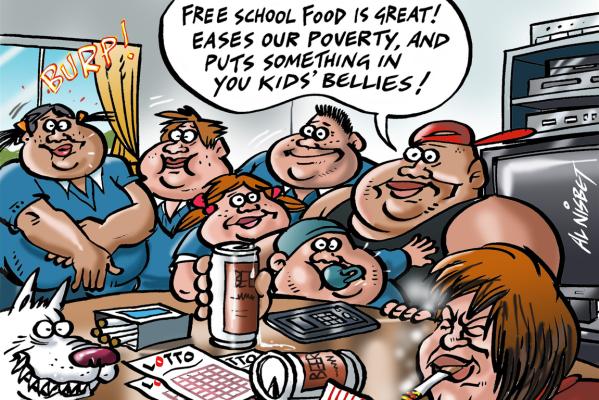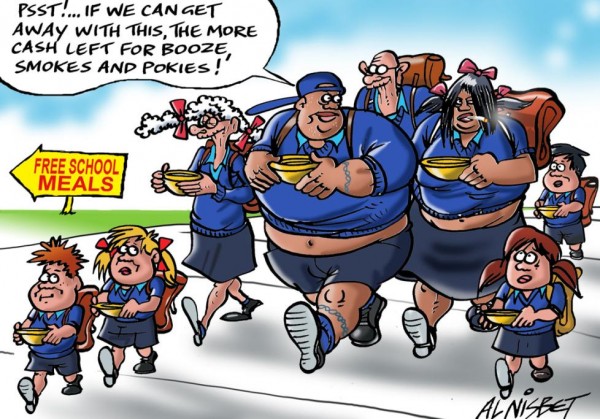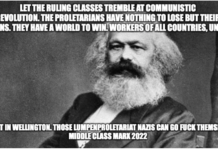Congratulations to Fairfax media for their detailed coverage of the current Human Rights Commission case being asserted by Louisa Wall that Al Nisbet’s cartoons were racist and deserved censure. Pity Fairfax published the cartoons in the first place however.
The Human Rights Commission is not in an enviable position. On one hand they are tasked with combating structural discrimination while balancing the rights of free speech.
Louisa Wall’s argument to date is that Section 61 of the Human Rights Act hasn’t been truly defended by the Human Rights Commission and that Nisbet’s cartoons clearly breached it…
Section 61 of the Human Rights Act says it is unlawful to publish matter that is “threatening, abusive, or insulting” if the words are “likely to excite hostility against or bring into contempt any group of persons…on the ground of the colour, race, or ethnic or national origins of that group of persons”.
…Fairfax lawyers argue that the section should only come into force when the material is effectively Nazi pamphlets demanding a hostile pogrom. Louisa counters that threshold is so ridiculously high as totally unattainable.
Protection isn’t really protection if it can never be triggered.
However free speech is also a right to shock, offend, and disturb any sector of the community.
So what is the Human Rights Commission to do? I think the HRC should look at the nature of satire for a solution.
For me, satire is satire and can use the freedom of speech defence when its target is the powerful.
Satire requires as its point of attack those who already have privilege. It’s a clever play on the power dynamic of those who have all the power.
Freedom of expression allows sharp political comment that speaks truth to power. That deserves protection because that’s an important dynamic within a healthy Democracy. ‘Humour’ that however attacks those in society with little power isn’t satire, it’s just mindless bullying and cheap stereotype juvenile scribblings.
We don’t want a State stepping in to Police the private thoughts and arguments of bigots, no such State with that level of coercion over the individual deserves to stand, but the mainstream media are our public squares and set the tone for important public debates and the Human Rights Commission has a responsibility to step into that arena and point out where the parameters of the debate should be.
Those parameters are incredibly broad, the right to shock, offend, and disturb any sector of the community, but tempered by the understanding of hegemonic power structures within our Society.
Letting Fairfax Media know they crossed the line is the point of the Human Rights Commission.







Yes. They did cross the line here.
The free food in schools is not about the parents – it is about the hungry children in our society, and their future – which is our countrys future – our children.
They deserve to be cared for and catered for, regardless of what their parents do.
Are parents who in their poverty and hopelessness and abuse, drink alcohol, any worse than a wealthy cheating tax evader who drinks champaigne in their lap of luxury?
Of course not!
Opinion
These cartoons, Paul Henry, etc – funny or just a little bit sickening.
My sister said she’d read a book ages ago about this tribe that had been made so poor that they would do things like push an old lady down and steal her food then laugh when she cried with hunger. Not too far off…
There is a new recommendation coming out today (or maybe it was yesterday) in Australia that suggests welfare payments should be made using a ‘credit’ type card. Using the technology that is available with modern computing systems the idea is that certain goods cannot be purchased using the welfare money that is loaded onto the card each week or fortnight or whatever the timing is.
So at the supermarket or warehouse or almost any store where everything is bar coded – only those goods that are on the approved bar code list can be purchased (or maybe the things that cant be purchased are blacklisted – Im not sure which way it will go).
On the black list will be all alcoholic drinks, all tobacco products, all luxury products (there will be a bit of angst deciding what are and arent), any form of gambling, etc.
This sort of thing obviously thus removes the possibility of welfare money being used for these sorts of things (well most of it anyway) and thus any suggestion that it is happening cant be honestly made – such as in the top cartoon.
It is a bit of an oxymoron to think that welfare money isnt being spent on at least alcohol when there are something like over 100 alcohol outlets in the Mangere/Otohuhu area alone. They wouldnt be there if there was no business. The population of this area according to the 2013 census was just over 80,000. Thats a liquor outlet for every 800 people. Thats almost a liquor outlet for every street !!! (on average)
If that is true Barry, then they should apply the same technology to our government, and its ministers!
I suppose the next step once the cards are underway, will be the microchipping – all lining up for the new one world order – using beneficiaries as the guinea pigs…
I don’t agree with any of it.
Comments are closed.